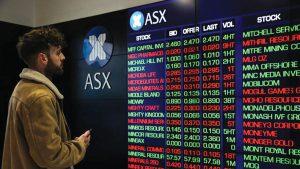BLOOMBERG
US futures and European stocks fluctuated on Tuesday trading, and the Australian dollar jumped after a surprise interest rate increase by the country’s central bank.
Contracts on US gauges were muted, following the S&P 500’s retreat. Apple Inc fell 0.4% in premarket trading, after dropping from an all-time as it unveiled its new mixed-reality headset at a steep price. Sentiment on tech was also muted as Taiwan Semiconductor Manufacturing Co — the main chipmaker to Apple — tempered its capital spending outlook.
In Europe, German bonds gained as consumer expectations for euro-area inflation eased significantly in April, adding to the case for the region’s central bank to conclude its rate-hike campaign this summer. An earlier report showed German factory orders unexpectedly fell in April, in a further sign of industrial weakness.
The Reserve Bank of Australia, on the other hand, said inflation was still too high and tightener monetary policy may be required in the country. The Australian dollar gained as much as 1% and the policy-sensitive three-year government note yield was around six basis points higher.
“The message from today is the same for all central banks: combating generational high levels of inflation will be an ongoing challenge,†said John Bromhead, a strategist at ANZ Banking Group Ltd.
In commodity markets, wheat surged after Ukraine said Russian forces blew up a giant dam in the country’s south, unleashing a torrent of floodwater that threatens thousands of people and poses a potential threat to Black Sea grain supplies. Prices jumped as much as 3% on Tuesday, extending their climb from a 30-month low last week.
The dam’s destruction “looks like a big escalation with dire consequences and huge headline risk,†Andrey Sizov, managing director at agricultural consultant SovEcon, said in a tweet.
“This could be just the start of the bull run.†Meanwhile, the US dollar was steady. The Treasury began its bill issuance flood that saw buyers storming into the upsized three- and six-month auctions, a move that many have expected will drain liquidity from the system.
Any move by the government or the Fed that can risk liquidity in the system “is something that will probably keep us in a range-bound mode until we see where it all lands, including the Fed’s final decision on rates,†Sylvia Jablonski, CEO and chief investment officer at Defiance ETF, said on Bloomberg Television.
Elsewhere, Asian stocks rose to a three-month high, helped by a rally in Chinese developers. There are signs that Beijing is taking steps to bolster the economy, with authorities asking some of the biggest banks to lower their deposit rates.
 The Gulf Time Newspaper One of the finest business newspapers in the UAE brought to you by our professional writers and editors.
The Gulf Time Newspaper One of the finest business newspapers in the UAE brought to you by our professional writers and editors.
